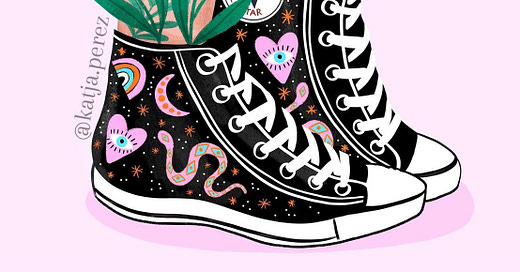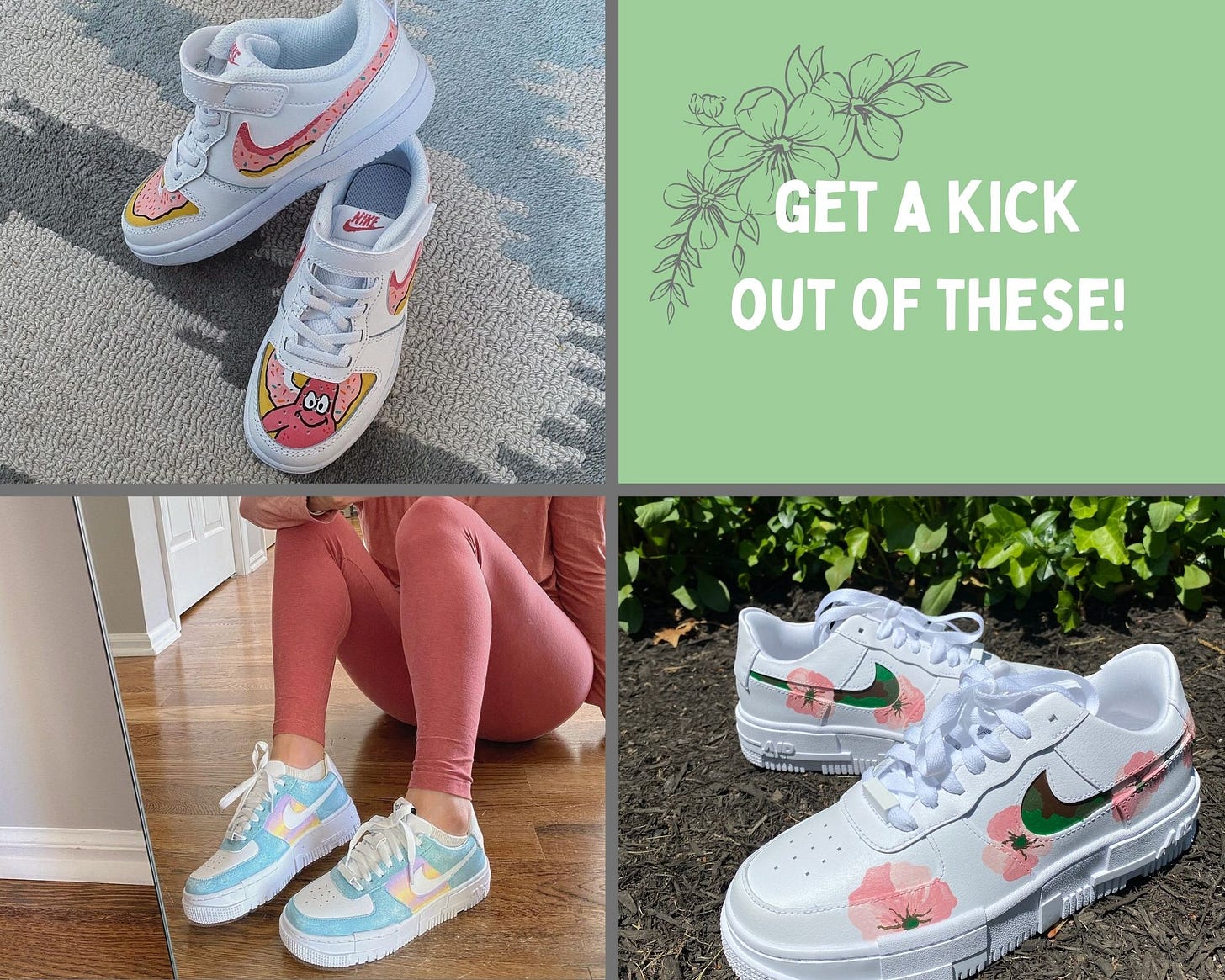Not everything good must be sold
If the rise of homegrown Etsy and Instagram businesses has taught us anything, it’s that there are makers and there are buyers. The two are not mutually exclusive. But oftentimes, a certain kind of person finds herself sifting through droves of personalized Cricut items and thinks to herself, “I could make these, too.”
I am a lifelong maker. Since childhood, I’ve been drawing, designing, and crafting, always finding ways to use that extra poof in a creative person’s brain to produce something. The act of making is not mind-numbing but mind-cleansing. I can put my nervous hands to work and give each detail one worry from my day. Whatever I produce is a vessel of those feelings, rinsed away from me and onto a child’s step stool.
My current fixation on paint pens began while pregnant with Ruby. She’d have most of what she’d need from her sister, so I thought it would be nice to register for some personalized items from a ritzy boutique. When I asked for the price of one plastic toy bucket to read “Ruby” (in tie dye, of course), the answer shocked my conscience. These gifts were expensive! Insane! I waddled out of the store, mumbling to myself, “I could make that,” and it began.
I researched the finest quality paint pens and bought my first set. I tried painting on every surface, from plastic, to wood, to something I thought was wood, to canvas, and leather. Each project was a larger challenge, and then I discovered #CustomNikes and went down a complete rabbit hole with sneakers. Soon, people started to want things. Many suggested I should start a business. I could charge. I could charge a lot.
But should I?
The insolvent trend of “hustle culture” bore the notion that outside of your day job, having an enjoyable side gig adds value to your life, but it’s only worth pursuing if you can make money. We see over-monetization everywhere, from the micro-influencer with a modest following who sells his own “merch,” to the seven-year-old girl in my town who “started a baking business” and sells through her mother on the local Facebook page. Sure, there are lessons to learn from testing your entrepreneurial spirit, but that doesn’t mean it makes sense to do it.
Not everything you enjoy must be monetized immediately – or ever. I examined my particular passion in great detail and came out on the side of not selling anything for the foreseeable future. If you are questioning whether to start a homegrown business of your own, here are some of the factors I considered to reach this conclusion.
Quality Control
Much of the crafting experience is trial and error. For example, certain surfaces require a base coat for the paint to stick – kind of like a manicure. I didn’t learn this on the internet but through coming back to half-vanished designs and little flakes of paint all over the floor. Some projects just don’t hold up well over time, and I still can’t find solutions. But most of my projects are too time-consuming and too expensive to test.
Customer satisfaction also falls under this umbrella. Personalized projects are subjective, and I may not always be able to accomplish exactly what a customer wants. My good friend started an accessories business out of our need for mask chains, and I watch her work with people get these custom orders just right. But unlike some other small businesses, correcting my orders wouldn’t be that easy. I could lose the entire value of a sale if I had to buy someone a new pair of Air Force 1s and repaint them.
Competition
Deep inside the echo chambers of your own internet circles, there are turf wars brewing. People are vying for your attention, and then, your money. On Instagram, it’s about the crafters. On Twitter, it’s about the merch. On Facebook, it’s about the DTC children’s clothing. With each refresh, it’s something new.
It may not be a cutthroat venture, per se, but it does come down to this: there can only be so many tie-dyers. A couple shoe painters. Even if you have goals to go national, much of your revenue comes from certain centers of influence, which don’t spread far beyond your own communities.
My day job presents non-stop conflicts that only I can resolve, so I don’t need to add any negative subtext to my life. Being a mom through a pandemic, enough of that exists already. Don’t believe me? I direct messaged several local painters to ask about what sealant spray they use. Not one would respond.
Value of Time
I don’t value my hours spent lawyering the same as my hours spent crafting. That would be silly. But one of the most salient lessons I’ve learned as a lawyer is how to value my time.
There are the hours you spend doing something, and the actual value of that something. For example (and I am oversimplifying), a straightforward answer to a complaint should take a lawyer X amount of time. If it takes quadruple that amount of time for no valid reason, you really shouldn’t bill for it all. This is a problem that plagues many young, inexperienced lawyers, who need to work on one task for hours upon real hours, but can only show a certain amount for it on paper. Those lost, uncaptured hours vanish into thin air, and the only person paying for them is you.
The projects I enjoy take up real hours. They are done by hand, with no stencils. They must dry. They require several layers, and sometimes, several days. And there’s a top end to what someone will pay for that kind of craftwork. I’m no Picasso – we’re talking about custom shoes and homewares here. It’s just not a great business model. Sure, I could do a ton of small party favors and turn a profit. But that’s not what I like to do.
In the end, if it isn’t your primary source of income, there’s no point in doing something you don’t like to do. Your enjoyment should really come first. Because unless the income from your day job is supplemental or not needed to support your household, it’s unlikely this side gig will blow up enough to quit. For a lot of people, I think, there’s an inkling of that hope. I’ve thought about how amazing my life would be to write and paint pen all day. It would be a dream, but it doesn’t make sense, and neither would putting myself up against all of the above to pretend it would.
It’s okay to have a hobby. Not everything good must be sold.
Instead, I find joy in gifting my projects to loved ones. Saying “I made that” means more than just finishing the project – it’s the giant hug from my friend who just had a baby, or the person who stops my stepmom on the street to ask who made her shoes. I made that happen, and it feels really good.
Are you a maker or a buyer? Share your projects: averagejoelle3@gmail.com.
The little things
Of course, I had to share some of these #customnikes with you first, but there will be many more projects coming your way. These three were very fun and fitting for spring.
ICYMI
I got coughed on. Remember? Anyway, I am so proud to have had the chance to tell this story in The Huffington Post. A huge thanks to everyone who has reached out to support me after reading about my ridiculous encounter.





